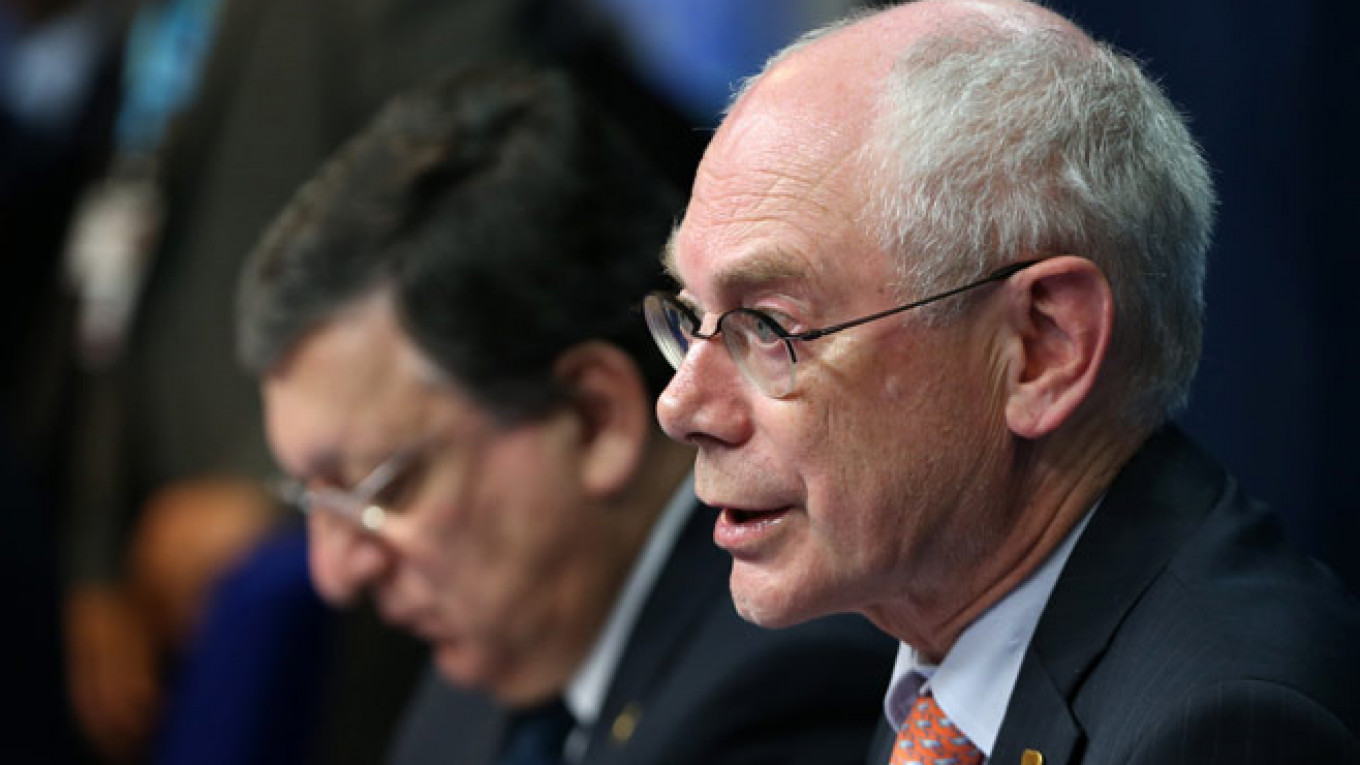In a strongly worded statement with at least one obscure literary reference, Russia's Foreign Ministry has lashed out at the European Union for its decision to impose sanctions against top security officials, saying the "irresponsible" move would "be greeted with enthusiasm by international terrorists."
Federal Security Service director Alexander Bortnikov and Mikhail Fradkov, the head of the foreign intelligence service, were among those added to the EU's sanctions list, which was released Friday and includes several other high-ranking officials and members of Russia's Security Council as well.
State Duma Deputy Mikhail Degtyaryov, Chechen leader Ramzan Kadyrov, Krasnodar Governor Alexander Tkachyov and Pavel Gubarev, "people's governor" of the self-proclaimed Donetsk People's Republic, were also included on the list.
The latest round of sanctions comes in the wake of the July 17 downing of Malaysia Airlines Flight MH17, in which more than 200 of the 298 people killed were European citizens.
German Foreign Minister Frank-Walter Steinmeier said "the death of 300 innocent people in the MH17 crash and the disrespectful roaming around the crash site of marauding soldiers, the behavior of Russia leaves us no other choice" but to impose further sanctions, in comments carried by newspaper Sueddeutsche Zeitung on Saturday.
With 15 people having been added to the list Friday alongside 18 new entities, the grand total of those sanctioned by the EU over the conflict in Ukraine now stands at 87 people and 20 organizations, all accused of contributing to the destabilization of eastern Ukraine, where pro-Russian separatists continue to battle Ukrainian troops.
Russia's Foreign Ministry denounced the move, saying it was based on "Washington and Kiev's fairy tales regarding the events taking place in Ukraine," and adding that the EU had "deprived itself of an alternative, objective, source of information" in its latest decision.
Moreover, the ministry questioned the wisdom of the EU decision from a security standpoint.
"The expanded sanctions list is testament to the fact that EU countries have taken a course of complete curtailment of cooperation with Russia on issues of international and regional security, including in the fight against the spread of weapons of mass destruction, terrorism, organized crime and other challenges and threats," the statement said.
The EU's decision to expand the sanctions to include top security officials "will be greeted with enthusiasm by international terrorists," the ministry said.
"The one thing they have not managed to do over the course of the last few decades — drive a wedge into the global community — was done easily in Brussels. And it is precisely Brussels that bears all responsibility for this step, taken amid a sharp deterioration in the international situation, especially in Afghanistan, the Middle East, North Africa and other places."
The statement opened with a literary allusion to Nikolai Gogol's 1836 satirical comedy of errors "The Government Inspector" by comparing the EU to one of the play's characters, the sergeant's widow.
In Gogol's work, the sergeant's widow is flogged by the local governor, but when confronted with this accusation, the governor accuses the woman of having flogged herself. Accordingly, the reference is frequently misinterpreted, often used interchangeably with the concept of "shooting oneself in the foot."
In the context of the EU's sanctions, it is unclear from the statement whether the Foreign Ministry is accusing the EU of flogging itself, or perhaps of having endured a flogging at the hands of Washington.
Despite a known penchant for strongly worded statements, the Foreign Ministry rarely boasts such obscure literary references.
See also:
Russia Rails Against EU Sanctions, Lambasts U.S. Over Ukraine
Contact the author at a.quinn@imedia.ru
A Message from The Moscow Times:
Dear readers,
We are facing unprecedented challenges. Russia's Prosecutor General's Office has designated The Moscow Times as an "undesirable" organization, criminalizing our work and putting our staff at risk of prosecution. This follows our earlier unjust labeling as a "foreign agent."
These actions are direct attempts to silence independent journalism in Russia. The authorities claim our work "discredits the decisions of the Russian leadership." We see things differently: we strive to provide accurate, unbiased reporting on Russia.
We, the journalists of The Moscow Times, refuse to be silenced. But to continue our work, we need your help.
Your support, no matter how small, makes a world of difference. If you can, please support us monthly starting from just $2. It's quick to set up, and every contribution makes a significant impact.
By supporting The Moscow Times, you're defending open, independent journalism in the face of repression. Thank you for standing with us.
Remind me later.






